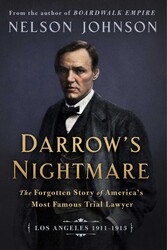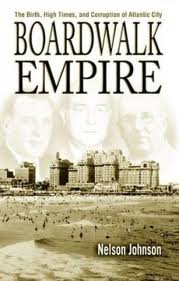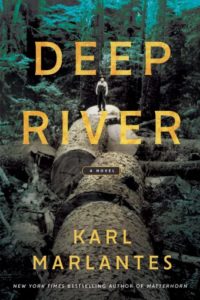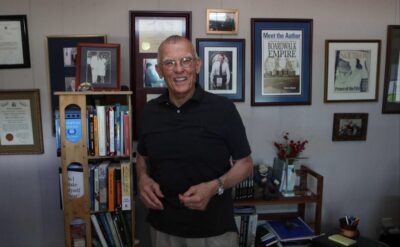Nelson Johnson: Darrow’s Nightmare-The Forgotten Story of America’s Most Famous Trial Lawyer
July 12, 2021 by David
Filed under Non-Fiction, WritersCast
 Darrow’s Nightmare: The Forgotten Story of America’s Most Famous Trial Lawyer (Los Angeles 1911–1913) – Nelson Johnson – 9781948122733 – 360 pages – April 20, 2021 – Hardcover – Rosetta Books – ebook editions available at lower prices
Darrow’s Nightmare: The Forgotten Story of America’s Most Famous Trial Lawyer (Los Angeles 1911–1913) – Nelson Johnson – 9781948122733 – 360 pages – April 20, 2021 – Hardcover – Rosetta Books – ebook editions available at lower prices
One of the great personal joys that working in the book business enables is that I get to work with authors. I’ve done some consulting with Rosetta Books, the publisher of Darrow’s Nightmare, and through the publisher have had the opportunity to meet and get to know former New Jersey judge Nelson Johnson, who turns out to be a terrific person, as well as a wonderful storyteller, historian, and writer.
I had known of Nelson Johnson mainly because his earlier best-selling book, Boardwalk Empire, became the basis of the excellent HBO series of the same name. Boardwalk Empire documents the tumultuous story of the Atlantic City in the early twentieth century, a time when racketeers and corrupt politicians ran the city. Boardwalk Empire is a terrific book with incredibly interesting characters and clearly, Nelson Johnson knows how to write history that conveys characters and their stories dramatically for readers.
In Darrow’s Nightmare, Nelson turns his attention to Clarence Darrow, one of the greatest trial attorneys in modern American history, in one of the most tumultuous and challenging episodes of his long career. Best known today for his role in the famous Scopes trial of 1925 (and the film, Inherit the Wind), Darrow was actually most famous in his earlier years as a brilliant defender of labor rights, at a time when organized labor was literally battling with business owners across the country for basic freedoms and policies we take for granted today.
In 1911, Darrow went to Los Angeles with his wife, Ruby, at the behest of union leaders there. He was to defend two union iron workers who had been charged with the murder of twenty employees of the Los Angeles Times, whose building had been bombed as part of a major labor dispute.
After he negotiated a plea bargain for the iron workers (with the help of Lincoln Steffens), Darrow himself was indicted for attempted bribery of a juror in the trial. Darrow was fortunate to be represented by the brilliant (though flawed) California criminal attorney Earl Rogers, who was himself one of the most successful trial attorneys in American history and with the help of Rogers and friendly juries, Darrow was able to escape being convicted in two different trials. He returned to Chicago in disgrace, set himself to rebuilding his career, and went on to take on some of what are now the most famous trials of his era, including the Leopold and Loeb case and the important civil rights Sweet case in Detroit, where he defended the right of a black family to self-defense. Looking over the arc of Darrow’s long legal career, the LA trials of 1911-1913 form the most crucial episode of his life.
These trials made national news at the time, but have been mostly lost to history now. Nelson has brought the entire scene to life in memorable prose. He may be one of the few who have read the entire 8,500 page trial transcript. It is quite a story and well worth reading. And Nelson tells the story behind the story in the podcast episode presented here, which I very much enjoyed recording.
Darrow captured the imagination of many Americans in his time in history. I think that reading Darrow’s Nightmare, you might be captured as well, and see him as a flawed hero, a human being much more complex than any film could portray.
“The marks of battle are all over his face” —H.L. Mencken
“A fascinating portrait of Clarence Darrow as we’ve never seen him before—as a criminal defendant. In Darrow’s Nightmare, Nelson Johnson tells the riveting tale of America’s most famous lawyer as he fights for his life, marriage, career, and reputation. I couldn’t put it down.” —Terence Winter, Creator & Executive Producer, Boardwalk Empire
Nelson C. Johnson practiced law for 31 years prior to being appointed to the New Jersey Superior Court. During his final five years on the bench, he was one of three judges in New Jersey assigned to litigation, involving product liability claims. In the early 1980s Nelson represented the Atlantic City Planning Board when the modern casino period was beginning. That experience motivated him to write Boardwalk Empire. He has written two other books about New Jersey history. During the past 15 years, Nelson has made more than 200 presentations on his books before a wide range of audiences.
He lives in Hammonton, New Jersey.
Buy the book here from Bookshop.org. Visit the author’s website here.
Podcast: Play in new window | Download
Karl Marlantes: Deep River, a Novel
November 19, 2019 by David
Filed under Fiction, WritersCast
 Deep River – Karl Marlantes – 978-0-8021-2538-5 – Atlantic Monthly Press – Hardcover – 736 pages – $30 – July 2, 2019 – ebook version widely available at lower prices.
Deep River – Karl Marlantes – 978-0-8021-2538-5 – Atlantic Monthly Press – Hardcover – 736 pages – $30 – July 2, 2019 – ebook version widely available at lower prices.
“Deep River seems a work born from Willa Cather by way of Upton Sinclair. But this new book is its own animal, and it’s something of a masterpiece… In Deep River, [Aino] takes her place beside Antonia Shimerda as one of the great heroines of literature.”—BookPage (starred review)
Several years ago I discovered Karl Marlantes’ first novel, Matterhorn, which is a loosely autobiographical novel about the Vietnam War, in which Karl served as a Marine lieutenant. I think that is one of the best war novels I have ever read and was pleased to interview Karl about that book.
That book was followed by a nonfiction book called What it is Like to Go to War, which I also read and was affected by. What I said in 2011 still holds true: this book is a deeply thoughtful and moving work of nonfiction about the nature and meaning of war, and what it means to the individual warriors who participate who fight, as well as to the society that gives them that responsibility.
It took Marlantes almost thirty years to write and rewrite Matterhorn. Almost ten years after he completed that book, he has now turned in a completely different book, an historical novel set in the early 1900s, starting in Russian occupied Finland and moving to the Pacific Northwest. The three Koski siblings, Ilmari, Matti, and the politically radical young Aino, flee Russian oppression and come to the United States.
They join a community of other Finns in the logging area in southern Washington, during a time when massive trees of the old growth forest are being harvested by hard working men and dangerous technology. It is fertile ground for the establishment of radical labor movements like the IWW (Industrial Workers of the World, also known as the Wobblies). The two Koski brothers build their lives in this environment amid danger and many challenges, while Aino, just one of the book’s many also hard working independent women, works to build a union in an environment where organized labor is not welcomed by the logging industry or the power structures of the day.
Karl has built this novel following the structure and characters of the great stories of the Finnish oral tradition, written down in the nineteenth century as the Kalevala. It is a truly magisterial novel that weaves together so many strands of American and immigrant cultures, documents the struggles of the early twentieth century in the great forests of the Pacific Northwest, and shows us how human beings find a way to make meaningful lives despite the harshest challenges. Nothing comes easy for the Koskis their friends and families, but everything about them is redemptive and strong. It’s impossible to read this book and not be moved.
Reading Deep River is a commitment – it’s a long book – and there are inevitably times when it becomes difficult to keep track of the whole story and the many compelling characters in the book. That is not a criticism. The book is gripping, and well worth the time and attention of the reader. And it is impossible not to read it in the context of our current political circumstance. Reading about the sacrifices made by workers in the early twentieth century, to make advances for labor that are now taken for granted, and imagining their struggles as evidenced by the characters in this book, who are so thoroughly human in their differences and outlooks, personalities and beliefs, brings forth a range of thoughts about what has become of America today. We live in a world that others made great sacrifices for, and have somehow managed to avoid making sacrifices of our own. The people of Deep River as imagined by Karl Marlantes, deserve better from us.
I had the great pleasure to interview Karl in New Haven in a building on the Yale campus, where he was visiting during his book tour.
Karl Marlantes graduated from Yale University and was a Rhodes Scholar at Oxford University, before serving as a Marine in Vietnam, where he was awarded the Navy Cross, the Bronze Star, two Navy Commendation Medals for valor, two Purple Hearts, and ten air medals. He is the author of the novel, Matterhorn and a work of nonfiction, What It Is Like to Go to War. He lives now in Washington State.
Buy Deep River from RJ Julia here.
Podcast: Play in new window | Download


